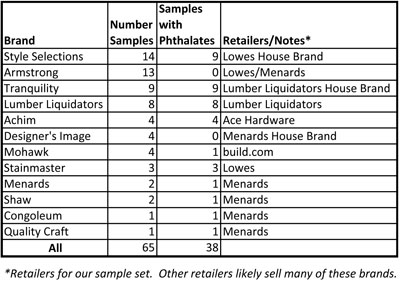Most vinyl tile flooring surface layers contained one or more hazardous chemicals.
The majority (58%) of vinyl tiles sampled contain phthalate plasticizers in the surface layer, which are hazardous at even low levels of exposure and have been banned in children’s toys. Moreover, almost all (89%) vinyl flooring surface layers contained organic tin-based stabilizers, commonly referred to as organotins. Over half of the samples tested contained multiple plasticizers. We also found safer alternative plasticizers in numerous flooring samples, indicating suppliers are beginning to transition to safer plasticizers.
Home Depot has made a commitment to phase out phthalates by end of 2015.
Our investigation reveals for the first time that Home Depot, the world’s largest home improvement retailer, has adopted a policy to eliminate the use of ortho-phthalates in all virgin vinyl flooring by the end of 2015. Home Depot is the first and only retailer to make this level of commitment. See Table 1. Learn more.
Table 1: Retailer Progress toward Eliminating Phthalates in Vinyl Flooring

Some retailers, manufacturers and brands are better than others.
- The poorest performing retailers: Two retailers, Lumber Liquidators and Ace Hardware, had phthalate plasticizers in 100% of the surface layer samples tested. See Table 2.
- Amongst flooring brands, Armstrong and Designer’s Image stood out for having 0% of tested tiles with phthalates in the surface layer. See Table 3.
- Lowe's (48%), Menards (23%), and build.com (25%) also had tiles that contained phthalates in the surface layer.
- Please note that the tested tile samples do not represent all tiles available at each store.
- Individual product test results are available at HealthyStuff.org; complete phthalate test results are also downloadable as a PDF.
Table 2: Phthalate Presence in Tested Surface Layers Sorted by Retailer

Table 3: Phthalate Presence in Tested Surface Layers Sorted by Brand

Healthier flooring alternatives are available.
Our study allows consumers to identify phthalate-free options. Also, many of the retailers surveyed sell non-vinyl flooring alternatives. Healthier flooring options included those made out of bio-based linoleum, natural rubber, and ceramic tile.

